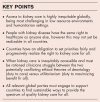Justifying access to kidney care in low resource and humanitarian settings
- PMID: 39225786
- PMCID: PMC11426978
- DOI: 10.1097/MNH.0000000000001023
Justifying access to kidney care in low resource and humanitarian settings
Abstract
Purpose of review: Access to and quality of kidney care is not equitable between or within countries. A natural question is whether global kidney care inequities are always unjustifiable and unfair, or are sometimes due to unavoidable competing or conflicting ethical duties or responsibilities.
Recent findings: Health is a fundamental right for all people. People with kidney conditions should have the same claim on this human right as others. Countries have an obligation to progressively fulfil this right and a duty to do so equitably, but global progress has been slow. Countries with limited resources or faced with humanitarian emergencies must set priorities to allocate resources fairly. This process involves trade-offs and often people requiring kidney replacement therapy are left out because of costs, logistics and lack of data. Major burdens are placed on clinicians who grapple between their duty to their patient and professional codes and their responsibility to a 'greater good'. These dilemmas apply also to industry, governments and the international community who must recognize their share in these duties.
Summary: Inequities in kidney health and care must be acknowledged and sustainable and collaborative solutions urgently found such that right to kidney care is progressively upheld for everyone everywhere.
Copyright © 2024 The Author(s). Published by Wolters Kluwer Health, Inc.
Conflict of interest statement
References
-
- Tannor EK, Chika OU, Okpechi IG. the impact of low socioeconomic status on progression of chronic kidney disease in low- and lower middle-income countries. Semin Nephrol 2022; 42:151338. - PubMed
-
This paper highlights how the social determinants of health impact risk of CKD and access to care in low and middle income settings at baseline.
-
- Liyanage T, Ninomiya T, Jha V, et al. Worldwide access to treatment for end-stage kidney disease: a systematic review. Lancet 2015; 385:1975–1982. - PubMed
-
This iconic paper clearly shows huge disparities in access to KRT globally.
-
- Vanholder R, Annemans L, Braks M, et al. Inequities in kidney health and kidney care. Nat Rev Nephrol 2023; 19:694–708. - PubMed
Publication types
MeSH terms
LinkOut - more resources
Full Text Sources
Medical
Research Materials


